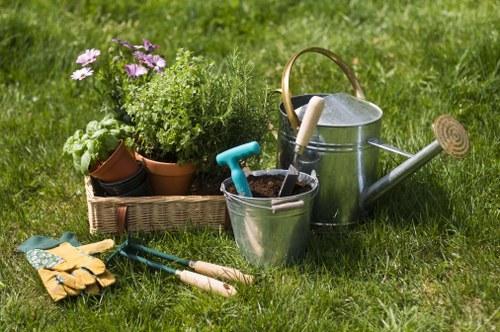Driveway Algae Removal in Fulham: Keep Your Driveway Pristine

Algae growth on driveways is a common issue, especially in damp and shaded areas. If you’re a resident of Fulham, you know how stubborn algae can be. Not only does it make your driveway look unsightly, but it can also make it slippery and hazardous. Understanding the best methods for driveway algae removal in Fulham is essential to maintaining both the aesthetics and safety of your property.
Algae thrives in environments where there is moisture, shade, and organic matter. Fulham’s climate provides an ideal setting for algae growth, particularly along driveways that receive minimal sunlight. The presence of algae can lead to a decline in your property’s curb appeal and potentially damage your driveway surface over time.
Addressing algae growth promptly is crucial. Ignoring the problem can result in more extensive and costly repairs down the line. With the right approach, you can effectively remove algae and prevent its return, ensuring your driveway remains clean and safe for years to come.

Understanding Algae Growth on Driveways
Algae is a simple plant that thrives in moist conditions. On driveways, it typically appears as a green, slimy coating on the surface. While algae itself is not harmful, its growth indicates excess moisture and can contribute to the deterioration of driveway materials such as concrete and asphalt.
The main factors contributing to algae growth include:
- Moisture: High levels of moisture from rain, dew, or poor drainage create a perfect environment for algae.
- Shade: Areas with limited sunlight reduce the driveway’s ability to dry out, promoting algae proliferation.
- Organic Matter: Debris such as leaves and dirt provide nutrients that fuel algae growth.
Understanding these factors can help you implement effective strategies to combat algae on your driveway.

Effective Methods for Driveway Algae Removal
Removing algae from your driveway involves a combination of cleaning techniques and preventive measures. Here are some effective methods tailored for Fulham residents:
1. Pressure Washing
Pressure washing is one of the most effective ways to remove algae buildup. Using a high-pressure water spray can quickly eliminate algae and other stains from your driveway surface.
2. Bleach Solutions
A mixture of bleach and water can effectively kill algae. However, it’s important to use this method cautiously to avoid damaging surrounding vegetation.
3. Eco-Friendly Cleaners
For a more environmentally friendly approach, consider using oxygen-based cleaners. These products are safer for plants and pets while still being effective against algae.
4. Vinegar and Baking Soda
A natural solution using vinegar and baking soda can help remove algae without harsh chemicals. This method is ideal for small to medium-sized areas.
5. Commercial Algae Removers
There are numerous commercial products available specifically designed to remove algae from driveways. These cleaners often contain ingredients that prevent algae from returning.

Preventing Algae Growth on Your Driveway
Prevention is key to maintaining a clean and algae-free driveway. Here are some tips to help prevent algae growth in Fulham:
- Improve Drainage: Ensure that water drains away from your driveway to reduce moisture buildup.
- Increase Sunlight Exposure: Trim overhanging trees and shrubs to allow more sunlight to reach your driveway.
- Regular Cleaning: Keep your driveway free from debris and organic matter that can foster algae growth.
- Seal Your Driveway: Applying a sealant can protect your driveway surface from moisture and algae buildup.
- Use Anti-Algae Treatments: Apply treatments that inhibit algae growth as a preventive measure.
By implementing these preventive measures, you can significantly reduce the likelihood of algae returning to your driveway.

Choosing the Right Professional for Driveway Algae Removal
While DIY methods can be effective, hiring a professional can ensure thorough and lasting results. Here’s what to consider when selecting a driveway algae removal service in Fulham:
Experience and Expertise
Choose a company with proven experience in algae removal. Experienced professionals understand the best techniques and products to use for different driveway surfaces.
Eco-Friendly Practices
Opt for services that prioritize environmentally friendly methods. This ensures the safety of your plants, pets, and the surrounding ecosystem.
Customer Reviews and Reputation
Check reviews and testimonials to gauge the reliability and quality of the service provider. A good reputation is a strong indicator of satisfactory results.
Cost and Value
Compare prices and services to find a provider that offers good value without compromising on quality.
Guarantees and Warranties
Look for companies that offer guarantees on their work. This provides peace of mind that the job will be done correctly and any issues will be addressed.
By carefully selecting the right professional, you can ensure effective, long-lasting algae removal for your driveway.
Local Areas Near Fulham for Driveway Algae Removal Services
Fulham is surrounded by several charming neighborhoods that also benefit from professional driveway algae removal services. Here are some nearby areas:
- Hammersmith: Just west of Fulham, Hammersmith offers a blend of residential and commercial properties, making algae removal essential for maintaining properties.
- Putney: To the southwest, Putney's lush areas and river proximity mean that driveways often require algae prevention and removal services.
- West Kensington: Northwest of Fulham, West Kensington's urban environment benefits from regular driveway maintenance to combat algae growth.
- South Kensington: East of Fulham, known for its museums and green spaces, driveways here also need upkeep to prevent algae buildup.
- Chiswick: Further west, Chiswick's residential streets often seek professional algae removal to maintain their picturesque appearance.
- Wandsworth: South of Fulham, Wandsworth's mix of housing types makes algae removal a common service request.
- Clapham: Southeast, Clapham's busy streets and vibrant community require effective driveway maintenance solutions.
- Earls Court: Close to Fulham, Earls Court benefits from driveway upkeep services to maintain its property standards.
- London Bridge: Northeast of Fulham, driveways in London Bridge area often need algae removal due to high foot traffic and shaded spaces.
- King’s Cross: Further northeast, King’s Cross's modern developments still contend with algae growth on various property surfaces.
- Chalk Farm: To the north, Chalk Farm's eclectic neighborhoods also require regular driveway maintenance.
- Balham: Southwest, Balham's sunny spots can reduce algae growth, but occasional removal services are still beneficial.
- Peckham: Southeast, Peckham's diverse architecture includes many driveways that benefit from algae prevention and removal.
- Notting Hill: West, Notting Hill's beautiful driveways often utilize professional services to keep them algae-free.
- Battersea: South, Battersea's mix of old and new properties need regular maintenance to combat algae and maintain curb appeal.
Regardless of which nearby area you reside in, professional driveway algae removal services can help keep your driveway looking its best.
Maintaining a Clean Driveway Post-Algae Removal
After successfully removing algae from your driveway, maintaining its cleanliness is essential to prevent future growth. Here are some maintenance tips:
Regular Cleaning
Mop up spills, sweep debris, and wash your driveway regularly to minimize the conditions that support algae growth.
Seal Your Driveway
Applying a high-quality sealant can protect your driveway from moisture and prevent algae from taking hold.
Trim Surrounding Vegetation
Keep trees and shrubs trimmed to allow maximum sunlight to reach your driveway, reducing dampness and shade.
Monitor Water Drainage
Ensure that water drains away properly from your driveway to avoid pooling and excessive moisture.
Use Preventative Treatments
Periodically apply preventative treatments designed to inhibit algae growth, keeping your driveway clean longer.
By following these maintenance practices, you can enjoy a clean and algae-free driveway throughout the year.
Eco-Friendly Algae Removal Options
Many homeowners in Fulham are increasingly interested in eco-friendly solutions for driveway algae removal. Here are some sustainable methods:
Baking Soda and Vinegar
This natural combination effectively kills algae without harming the environment. Mix equal parts baking soda and vinegar, apply to the affected area, and scrub gently.
Hydrogen Peroxide
Hydrogen peroxide is a powerful oxidizer that can eliminate algae. It breaks down into water and oxygen, making it an environmentally safe option.
Eco-Friendly Cleaners
There are commercial eco-friendly cleaning products designed specifically for algae removal. These products minimize environmental impact while providing effective results.
Biodegradable Detergents
Using biodegradable detergents ensures that the cleaning process does not introduce harmful chemicals into the surrounding ecosystem.
Steam Cleaning
Steam cleaning uses high-temperature steam to remove algae, eliminating the need for chemical cleaners altogether.
Choosing eco-friendly algae removal methods helps protect the environment and keeps your driveway safe for pets and plants.
Common Mistakes to Avoid During Algae Removal
When removing algae from your driveway, avoiding common mistakes can ensure a more effective and safer process:
- Using Excessively High Pressure: Overusing pressure washers can damage your driveway surface. Always use the appropriate pressure setting.
- Ignoring Safety Precautions: Always wear protective gear when handling cleaning agents to protect your skin and eyes.
- Neglecting Proper Ventilation: If you’re using chemical cleaners, ensure the area is well-ventilated to avoid inhaling harmful fumes.
- Overusing Chemicals: Excessive use of bleach or other chemicals can damage your driveway and surrounding vegetation. Follow recommended guidelines.
- Skipping the Sealant: Not sealing your driveway after cleaning can leave it vulnerable to future algae growth and weather damage.
- Failing to Address Underlying Issues: Simply removing algae without addressing moisture or shade issues will result in recurrent growth.
By avoiding these mistakes, you can achieve a cleaner, safer, and longer-lasting algae-free driveway.
The Benefits of Professional Algae Removal Services
Hiring a professional for driveway algae removal offers numerous advantages:
- Expertise: Professionals have the knowledge and experience to effectively remove algae and prevent its return.
- Time-Saving: Cleaning a driveway can be time-consuming. Professionals can complete the job efficiently, saving you valuable time.
- Proper Equipment: Access to specialized equipment ensures thorough cleaning without damaging your driveway.
- Safety: Professionals are trained to handle cleaning agents safely, reducing the risk of accidents.
- Long-Term Solutions: Experts can identify and address underlying issues that contribute to algae growth, providing long-term solutions.
- Guaranteed Results: Reputable companies often offer guarantees, ensuring the job is done to your satisfaction.
Investing in professional driveway algae removal can enhance the appearance and longevity of your driveway, providing peace of mind and lasting results.
Cost of Driveway Algae Removal in Fulham
The cost of driveway algae removal can vary based on several factors, including the size of your driveway, the extent of algae growth, and the method used for cleaning. On average, you can expect to pay:
- Pressure Washing: £100 - £200 depending on driveway size.
- Chemical Treatments: £150 - £300, influenced by the type of chemicals and area covered.
- Eco-Friendly Solutions: £120 - £250, varying with the products used.
- Professional Services: £200 - £400, which may include sealing and preventive treatments.
It’s advisable to obtain multiple quotes from local providers in Fulham to ensure you’re getting competitive pricing. Investing in quality services may save you money in the long run by preventing recurrent algae growth and driveway damage.
Seasonal Considerations for Algae Removal
Algae growth can be influenced by seasonal changes. Understanding how different seasons affect algae can help you plan effective removal and prevention strategies:
- Spring: Increased rainfall and warmer temperatures can lead to rapid algae growth. Early spring cleanup can prevent extensive buildup.
- Summer: Dry and sunny periods help reduce moisture, but shaded areas may still experience algae issues. Maintain regular cleaning.
- Autumn: Falling leaves and increased moisture create ideal conditions for algae proliferation. Prompt removal of debris is essential.
- Winter: While colder temperatures slow algae growth, moisture from snow and ice can still be problematic. Ensure proper drainage to prevent mold and algae.
By aligning your algae removal efforts with seasonal changes, you can maintain a clean and safe driveway throughout the year.
Conclusion: Keep Your Driveway Algae-Free in Fulham
Driveway algae removal in Fulham is a crucial aspect of property maintenance. By understanding the factors that contribute to algae growth and implementing effective removal and prevention strategies, you can preserve the beauty and safety of your driveway. Whether you choose DIY methods or enlist the help of professionals, taking proactive steps ensures your driveway remains pristine and functional.
Remember to address underlying issues such as moisture control and shade management to prevent future algae growth. Regular maintenance and eco-friendly cleaning practices not only enhance your home’s curb appeal but also contribute to a healthier environment.
Investing in driveway algae removal today will save you time, money, and effort in the long run, ensuring your Fulham property remains a source of pride and comfort.
Frequently Asked Questions
1. How often should I clean my driveway to prevent algae growth?
Regular cleaning twice a year, ideally in spring and autumn, helps prevent algae buildup. Additionally, addressing spills and debris promptly can minimize growth.
2. Can algae damage the surface of my driveway?
Yes, while algae itself isn't harmful, prolonged moisture from algae can lead to surface deterioration and potential damage to the driveway material.
3. Are eco-friendly algae removal methods as effective as chemical treatments?
Eco-friendly methods can be highly effective when used correctly. They are a great alternative for those concerned about environmental impact and safety.
4. Do I need to seal my driveway after algae removal?
Sealing your driveway after cleaning provides an additional layer of protection against moisture and helps prevent future algae growth.
5. When is the best time of year to remove algae from my driveway in Fulham?
The best times are during the spring and autumn seasons when weather conditions are favorable for cleaning and drying, reducing the likelihood of immediate regrowth.


